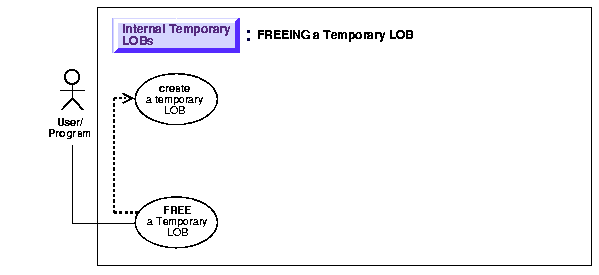Release 1 (9.0.1)
Part Number A88879-01
Home |
Book List |
Contents |
Index | Master Index | Feedback |
| Oracle9i Application Developer's Guide - Large Objects (LOBs) Release 1 (9.0.1) Part Number A88879-01 |
|
Temporary LOBs, 7 of 29

|
See:
"Use Case Model: Internal Temporary LOBs", for all basic operations of Internal Temporary LOBs. |
This procedure describes how to free a temporary LOB.
A temporary LOB instance can only be destroyed for example, in OCI or the DBMS_LOB package by using the appropriate FREETEMPORARY or OCIDurationEnd or OCILOBFreeTemporary statements.
To make a temporary LOB permanent, the user must explicitly use the OCI or DBMS_LOB copy() command and copy the temporary LOB into a permanent one.
See Chapter 3, "LOB Support in Different Programmatic Environments" for a list of available functions in each programmatic environment. Use the following syntax references for each programmatic environment:
Not applicable.
Examples are provided in the following programmatic environments:
DECLARE Dest_loc BLOB; Src_loc BFILE := BFILENAME('AUDIO_DIR', 'Washington_audio'); Amount INTEGER := 4000; BEGIN DBMS_LOB.CREATETEMPORARY(Dest_loc,TRUE); /* Opening the BFILE is mandatory: */ DBMS_LOB.OPEN(Src_loc, DBMS_LOB.LOB_READONLY); /* Opening the LOB is optional: */ DBMS_LOB.OPEN(Dest_loc,DBMS_LOB.LOB_READWRITE); DBMS_LOB.LOADFROMFILE(Dest_loc, Src_loc, Amount); /* Closing the LOB is mandatory if you have opened it: */ DBMS_LOB.CLOSE(Src_loc); DBMS_LOB.CLOSE(Dest_loc); /* Free the temporary LOB: */ DBMS_LOB.FREETEMPORARY(Dest_loc); END;
/* This function creates a temporary LOB and then frees it: This function returns 0 if it completes successfully, and -1 otherwise: */ sb4 freeTempLob(OCIError *errhp, OCISvcCtx *svchp, OCIStmt *stmthp, OCIEnv *envhp) { OCILobLocator *tblob; checkerr (errhp,OCIDescriptorAlloc((dvoid*)envhp, (dvoid **)&tblob, (ub4)OCI_DTYPE_LOB, (size_t)0, (dvoid**)0)); if(OCILobCreateTemporary(svchp,errhp,tblob,(ub2)0,SQLCS_IMPLICIT, OCI_TEMP_BLOB, OCI_ATTR_NOCACHE, OCI_DURATION_SESSION)) { (void) printf("FAILED:CreateTemporary():freeTempLob\n"); return -1; } if(OCILobFreeTemporary(svchp,errhp,tblob)) { printf ("FAILED: OCILobFreeTemporary call in freeTempLob\n"); return -1; }else { printf("Temporary LOB freed in freeTempLob\n"); } return 0; }
This script is also located at $ORACLE_HOME/rdbms/demo/lobs/oci/tfree
IDENTIFICATION DIVISION. PROGRAM-ID. FREE-TEMPORARY. ENVIRONMENT DIVISION. DATA DIVISION. WORKING-STORAGE SECTION. 01 USERID PIC X(11) VALUES "SAMP/SAMP". 01 TEMP-BLOB SQL-BLOB. 01 IS-TEMP PIC S9(9) COMP. 01 ORASLNRD PIC 9(4). EXEC SQL INCLUDE SQLCA END-EXEC. EXEC ORACLE OPTION (ORACA=YES) END-EXEC. EXEC SQL INCLUDE ORACA END-EXEC. PROCEDURE DIVISION. FREE-TEMPORARY. EXEC SQL WHENEVER SQLERROR DO PERFORM SQL-ERROR END-EXEC. EXEC SQL CONNECT :USERID END-EXEC. * Allocate and initialize the BLOB locators: EXEC SQL ALLOCATE :TEMP-BLOB END-EXEC. EXEC SQL LOB CREATE TEMPORARY :TEMP-BLOB END-EXEC. * Do something with the temporary LOB here: * Free the temporary LOB: EXEC SQL LOB FREE TEMPORARY :TEMP-BLOB END-EXEC. EXEC SQL FREE :TEMP-BLOB END-EXEC. STOP RUN. SQL-ERROR. EXEC SQL WHENEVER SQLERROR CONTINUE END-EXEC. MOVE ORASLNR TO ORASLNRD. DISPLAY " ". DISPLAY "ORACLE ERROR DETECTED ON LINE ", ORASLNRD, ":". DISPLAY " ". DISPLAY SQLERRMC. EXEC SQL ROLLBACK WORK RELEASE END-EXEC. STOP RUN.
This script is also located at $ORACLE_HOME/rdbms/demo/lobs/oci/tfree
#include <oci.h> #include <stdio.h> #include <sqlca.h> void Sample_Error() { EXEC SQL WHENEVER SQLERROR CONTINUE; printf("%.*s\n", sqlca.sqlerrm.sqlerrml, sqlca.sqlerrm.sqlerrmc); EXEC SQL ROLLBACK WORK RELEASE; exit(1); } void freeTempLob_proc() { OCIBlobLocator *Temp_loc; EXEC SQL WHENEVER SQLERROR DO Sample_Error(); EXEC SQL ALLOCATE :Temp_loc; EXEC SQL LOB CREATE TEMPORARY :Temp_loc; /* Do something with the Temporary LOB: */ EXEC SQL LOB FREE TEMPORARY :Temp_loc; EXEC SQL FREE :Temp_loc; } void main() { char *samp = "samp/samp"; EXEC SQL CONNECT :samp; freeTempLob_proc(); EXEC SQL ROLLBACK WORK RELEASE; }
To free a temporary BLOB, the JDBC application can either use the freeTemporary instance method to free the current BLOB object, or pass the temporary BLOB to be freed to the static freeTemporary method to free the specified temporary BLOB. These two methods are defined as follows:
/** * Free the contents and the locator of the temporary blob. * @param temp_lob A temporary blob to be freed. * @exception SQLException if temp_lob is a permanent lob or temp_lob has already been freed. */ public static void freeTemporary (BLOB temp_lob) throws SQLException /** * Free the contents and the locator of the temporary blob. * @exception SQLException if self is a permanent lob or self has already been freed. */ public void freeTemporary() throws SQLException The usage example example is -- BLOB tempBlob1 = ... BLOB tempBlob2 = ... // free the temporary BLOB tempBlob1.freeTemporary (); // free the specified temporary BLOB BLOB.freeTemporary(tempBlob2); The new freeTemporary APIs should replace the previous workaround of using dbms_ lob.freeTemporary() in dbms_lob PL/SQL package.
To free a temporary CLOB, the JDBC application can either use the freeTemporary instance method to free the current CLOB object, or pass the temporary CLOB to be freed to the static freeTemporary method to free the specified temporary CLOB. These two methods are defined as follows:
/** * Free the contents and the locator of the temporary blob. * @param temp_lob A temporary clob to be freed. * @since 8.2.0 * @exception SQLException if temp_lob is a permanent lob or temp_lob has * already been freed. */ public static void freeTemporary (CLOB temp_lob) throws SQLException /** * Free the contents and the locator of the temporary clob. * * @since 8.2.0 * @exception SQLException if self is a permanent lob or self has * already been freed. */ public void freeTemporary() throws SQLException
Use the free temporary BLOB API as follows:
CLOB tempClob1 = ... CLOB tempClob2 = ... // free the temporary CLOB tempClob1.freeTemporary (); // free the specified temporary CLOB CLOB.freeTemporary(tempClob2);
The freeTemporary API replaces previous workarounds that use DBMS_LOB.freetemporary().
|
|
 Copyright © 1996-2001, Oracle Corporation. All Rights Reserved. |
|